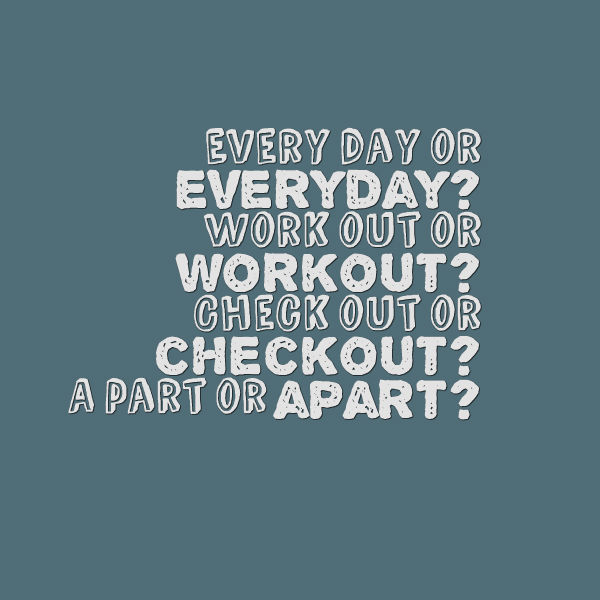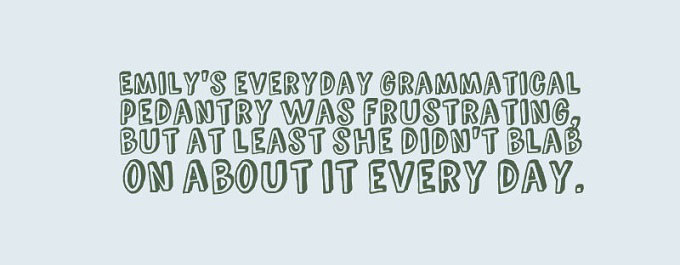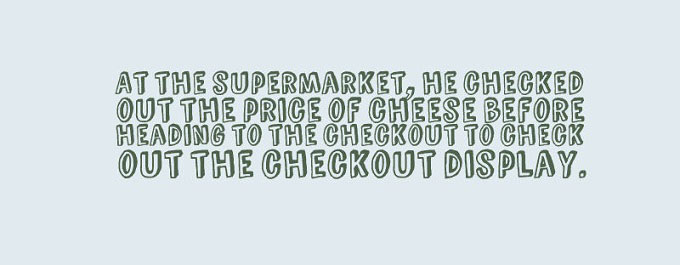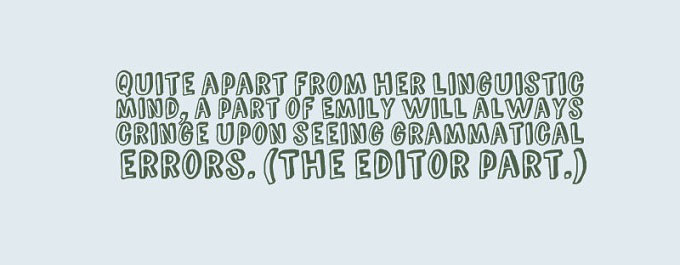When is a word not a word?
When it should be two words.
Thank you all for your enthusiasm with the launch of Practical Grammactical last month. (And particularly big thanks to Bron at Maxabella loves for kicking it all off by asking for this guest post.) The response has been wonderful, and the questions have been flowing into the facebook inbox.
Okay, you got me. There have been a grand total of six questions so far. But I’m still excited!
One particular question from Karen (hi Karen!) caught my attention, because I’ve seen examples of it myself:
My gym has a sign that says ‘Come and workout here!’ and it bugs me. And I don’t know if it’s supposed to bug me or if it’s actually correct and there’s actually a bug in my head. What’s the deal with workout and work out? Are they interchangeable? Why does English hate me?
Okay. First things first. English doesn’t hate you, Karen. English hates everybody.
Just joking. English is wonderful! We love you, dear English language! (Please don’t smite us.)
Let’s discuss the difference between ‘workout’ and ‘work out’. But let’s warm up with another one word/two words confusion that often trips people up. One that used to be close to my blogging heart.
Everyday or every day?
Those of you who have been following this blog since before Christmas will understand why the misuse of ‘every day’ and ‘everyday’ gets my goat more than it has the right to get the goat of anyone who claims to be a descriptive linguist.
Before this blog moved to this URL and was renamed emhawkerblog, it was called You learn something new every day.
You learn something new every day. Every. Day. Two words. Not one. But often when it was quoted or discussed elsewhere, it would be written as ‘You learn something new everyday’. Everyday. One word. Not two.
I bit my tongue, because nobody likes a grammatical pedant. Besides, everyone knew what was meant, and as I’ve said before, the main purpose of language is mutual comprehension. (And people were talking about my blog! LIKE OH EM GEE WOOHOO THAT’S TOTES AWESOME CALL IT WHATEVER YOU LIKE!)
But it grated. So here’s the deal if you want to get it right (where ‘right’ means in agreement with our national dictionary definitions at the time of publishing this post):
‘Everyday’ is an adjective. It means ordinary. Regular. Mundane. If something is an everyday thing, it’s a regular, expected thing. It can also mean daily, which is where the confusion arises. But it’s an adjective, not a noun. It can’t replace ‘every day’. Because…
… ‘every day’ is a noun phrase (where the adjective ‘every’ modifies the noun ‘day’). When something happens every day, it actually happens every day. I write every day. I sleep every day (in varying amounts). And I think about chocolate every day. Every. Single. Day.
And that right there is a great test for it if you get stuck. If you’re not sure whether to use ‘everyday’ or ‘every day’, try inserting the word ‘single’ in the middle. If you can, you’re after the two-word version.
Or try substituting ‘each’ for ‘every’. You learn something new each day wouldn’t have been as catchy, but there would have been less tongue-biting!
Workout or work out? Checkout or check out?
These ones are really easy. Really, really easy. I promise. Once you get it, you’ll never unget it.
(I just invented a word. Please use ‘unget’ in a sentence today. Let’s get it into the dictionary by 2018. Future pedants can then attempt to unget it. I just invented a secondary definition for my newly invented word. See? English is fun! Sorry. I digress. Back to ‘workout’, ‘work out’, ‘checkout’ and ‘check out’.)
The single words are nouns. A workout is an exercise that you perform. A checkout is something you visit to purchase goods, or a procedure that you carry out when leaving a facility.
The word pairs are verbs followed by adverbs. You work out solutions to problems. You work out at the gym. You check out people you fancy. You check out of hotels.
A good test for this one is to see if you can change the tense. If you can, you’re after the two-word version.
Apart or a part?
Here’s another one I often see mixed up, and a lot of the time I think we can point the finger squarely at autocorrect. That cheeky little electronic imp likes nothing better than to push ‘a’ and ‘part’ together at every opportunity.
‘Apart’ is an adverb. It means in pieces or separately. To take something apart is to take it to pieces. To look at something apart from something else is to look at it separately from something else.
‘A part’ is a noun phrase. Your elbow is a part of your body. Your Nickelback CD is a part of your music collection (and I totally judge you for it). Your love of Cadbury Peppermint Dairy Milk is a part of your chocolate addiction. Sorry, my chocolate addiction. My bad. Boom tish.
I often see sentences like this: I feel like apart of this community. Ignoring the fact that the adverb and preposition don’t agree with each other, if you read this with the above definitions in mind, you might think that this person feels separated from their community. In actual fact, when you separate the words – I feel like a part of this community – the opposite is true.
And if you don’t ignore the preposition? You’ve found a good test for it. Generally speaking, if it’s followed by a ‘from’, you want the one-word version. If it’s followed by ‘of’, use two words.
Another test? (A better test, usually.) Try inserting an adjective between the ‘a’ and the ‘part’. A big part. A small part. An important part. If it works, you’re after the two-word version.
—
And that’s it! Or that’s all I can fit in this post.
Enjoy second-guessing every compound word you use from now on, everyone! (Every one? No, definitely everyone.) Apologies in advance.
What do you think? Helpful? Too much like a Year 8 English lesson? All feedback and comments appreciated.
And do you have any grammatical grumbles you need help with? Share them here!





Oh my goodness you scare me. This is great stuff but now I’m scared. Nervous …
Keep writing this. We neeeed this.
L
Sorry. I hope it’s a good scary. If there is such a thing. I will keep writing!
This is great – I love these. My grammar and spelling a shocking, so I’m always interested in what I don’t know….
Thanks Lydia! Happy to help.
Yesterday, my 40 year old husband asked me if ‘good morning’ was one word or two?!
Oh dear! Which reminds me, ‘thank you’ is another one that people often push together. And ‘a lot’.
Fabulous and funny! X (the one that annoys me that I believe never has a case for a one word option but I often see it is “a lot”
Thank you! I didn’t think this one was anywhere near as fun as the last, so it’s nice to get that feedback.
And I didn’t mention ‘a lot’ because nothing will EVER top this post from Hyperbole and a Half:
http://hyperboleandahalf.blogspot.com.au/2010/04/alot-is-better-than-you-at-everything.html
Totes luv your grammar posts – they’re so gooden!
My 13 year old Son is a spelling freak and his fav thing to do is spot these errors on television, online etc. He and I get right into it – some kind of weird Mother and Son bonding thingee. Totes nerds huh!
Thanks Jody! That’s a fun game to play, until you realise how many there are. Then it’s a bit sad.
The English language has a lot to answer for doesn’t it?
It does. But so do we, as speakers of it. We deride people learning the language for their mistakes, while making heaps of them ourselves.
Great post. I may need you to weigh in on my Aussie Giveaway Linkup debate. I took the linky over recently and want to change from linkup to linky or link up. I touch on this on my May Day post.
I’d at least have a hyphen between the ‘link’ and the ‘up’. But linky gets rid of the confusion altogether. Even if there is a red squiggly line under it on my computer right now!
I love this , i totally get it and I’m sadly guilty when I rush things out. Plus autocorrect ? auto correct or auto-correct me.
I’ll be folowing along (not a long)
Haha! Autocorrect for me, but the hyphenated version is also acceptable. Consistency rules!
Nice! I love that you can actually explain those using real grammar terms! I know when it looks right and wrong, but I couldn’t for the life of me tell you WHY.
Thanks. Most of mine is instinct too – I rarely sit here proofreading things and thinking about nouns, verbs and the different parts of speech. It makes writing these posts extra fun! (No sarcasm – geek alert.)
I love this… So simple when you add the changes to the words… Will be showing my children this
Thanks Natalie! I hope it helps them. When in doubt about whether something’s one or two words, the insertion test is usually the best one.
I’m too impatient for grammar (I know, and I’ve been calling myself a writer for HOW LONG?) but any talk about verbs and nouns just makes me want to play Mad Libs 🙂
I’ve never played. What is wrong with me?
Love these posts, Em. Hopefully I won’t unget all that you’ve taught me so far. I am certain I’ve slipped up with the two word vs one word issue in the past. I can usually just tell though if it looks or sounds right or not. So what are you teaching us next? 🙂
YOU USED UNGET!!! You are officially my favourite person. As for what’s next, I’m trying to decide between a few things. Probably lists and bullet points.
Fabulous post Em! Although I’d hate to say your tongue twisters after a few drinks… Reading your posts on grammar makes me feel sorry for anyone having to learn English as a second language.
Thanks Tash. English as a second language is HARD. Any language is, but our exception counts are VERY high!
All hail the grammar queen. Next time I am having a debate with someone (like hubby!) over words, you are my ‘call a friend’!
Thanks Malinda! Looking forward to that call. (I already play this role with most of my friends! I remember giving advice back once and having them dispute it, so I photographed the relevant pages of the dictionary and sent them through. Ha!)
Great stuff Em, explained perfectly, clear as mud. No seriously crystal clear. Thanks for sharing.
Leaving some fairy wishes and butterfly kisses from #teamIBOT
Clear as mud. Was worried about that. Thanks!
My brain hurts. I tend to do this stuff by feel. The rules of grammar terrify me.
They can be terrifying. Mostly because they keep changing as constant ‘misuse’ (for want of a better word) wears them down. Wrong becomes the new right. Because lazy? Because evolution? Because whatever.
Thank you for this clarification! I will show this to my kids this afternoon! You make grammar seem so simple!
Thanks Ingrid! There seems to be a lot of sharing with kids – I’m enjoying this.
My biggest grammar grumble is a word that’s actually OKAY but I hate it. The word ‘addicting’.
“He found the drink addicting.” I’ve googled endlessly and it’s APPARENTLY allowed, but I hate it. Why not use addictive for god’s sake?!
Okay, rant over!
Ooh, addicting gives me shivers. In the bad way. I feel your pain.
Emily. Will you please promise me when and if you read my blog you will please point out any silly errors. I would highly appreciate it and will reward you with chocolate/wine when next we meet. P.S. I’ve only just realised the difference between lying and laying. Shame.
Yes, I can do that. I don’t like to without being asked, but now that you’ve given me the green light, no probs. Can’t recall ever having seen any glaring grammatical bloopers, though. And that’s a great one! Future blog post material. x
I wish they taught grammar when I was at school. I like to think that for the most part I’m pretty across correct grammar, but if I don’t know how to correctly phrase something (or spell something for that matter!) I’ll completely reword my sentence to avoid making a mistake!!
That’s a great tip in general. There’s always another way you can phrase what you’re trying to say, or another word you can use. When in doubt, start again!
Great post. While I like to think of myself as a fellow grammar guru, I still get scared by words like ‘preposition’. When people start talking about ‘split infinitives’, I break out in a cold sweat. In fact, could you write a post just like this where you explain in clear English exactly what all those scary grammatical terms mean?
Nothing wrong with splitting infinitives. When it’s necessary. And yes – thanks for the suggestion! Perhaps a few more posts down the track if people are still interested, but that’s a great idea.
Oh, a woman after my own heart! The every day/everyday thing bugs me too. I used to be an ESL teacher, and before that a proofreader, and I try very hard not to judge people on their grammar but it’s Oh So HARD sometimes! x
So very hard! I don’t judge per se, I just find it hard not to correct it. In a trying-to-help kind of way. But unless I’ve been asked to help, I zip my lip.
The word nerd in me loves this. On the other hand, I don’t think I could write a whole post about correct word usage, so well done.
Thanks Kathy! Appreciate it.
I do the every (single) day thing in my head all the time. So glad to know I was on the right track with it!
It’s a great trick! You’ll never go wrong with it. x
My brain hurts.. but in a good way. You gave it a workout bahahaha xx
It’s like an exercise class for the brain! I LOVE that analogy. Thank you x
Bravo, Em! Keep talking grammar to me, baby!
Thanks Grace! x
I’m playing catch up! Hello! I love this series and thank you for linking to me (you do not have to do that every time, we’re good!). I hope that the only time I confuse my one word / two word thing is when I make iTypos. I suck at grammar on my phone!! x